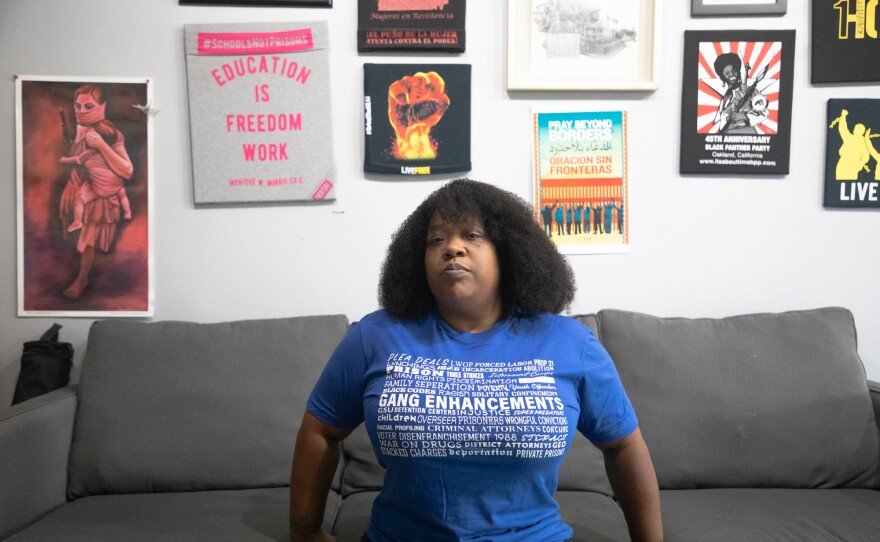San Diego hired its first chief race and equity officer over the summer, and months later questions are still being raised about what she will do.
Kim Desmond will oversee the new office of race and equity and report to Mayor Todd Gloria. Her job, Gloria’s office says, is to provide advice and guidance to city departments and create new ways to improve transparency in local government.
Desmond’s arrival follows questions the city has faced about whether the city treats its employees and residents fairly: from policing and the treatment of unhoused San Diegans to hiring practices and pay equity.
Her hire also came in the wake of George Floyd’s murder and a national demand for racial justice. San Diego City Councilmember Monica Montgomery Steppe proposed creating the position.
“That type of murder impacts the humanity of all of us,” Desmond said recently in an interview with inewsource. “That’s what I would say is important about the George Floyd murder is not being complacent or silent when you are seeing the humanity of someone stolen.”
Prior to coming to San Diego, Desmond held a similar role in the mayor’s office in Denver. There she said she led a citywide antiracism race and social justice academy, helped carry out the integration of diversity, equity and inclusion strategies across city government, and oversaw the community racial equity council.
Despite Desmond's more than 15 years of experience, some community leaders question how much of an impact she can make, especially in a city as robust and busy as San Diego.
“I haven’t seen any governmental institutions… that have provided equity to anyone. I believe the try is sincere,” said Laila Aziz, director of Pillars of the Community, a faith-based organization focused on helping people affected by the criminal justice system. “But, I believe racism is so entwined within the fabric of everything in society, you would have to literally redo millions of knots in order to get it out.”
It’s a challenge Desmond says she is willing to undertake.
What does a chief race and equity officer do?
Being new to San Diego, she said her days involve listening to and learning from employees of various city departments and stakeholders. Her goal is to learn more about department practices and policies being deployed to make sure the city is inclusive and equitable, Desmond said.
Although some question how effective the role will be, Desmond says she has confidence in her ability to bring about positive change because her entire career has been focused on addressing disparities. She said one of the motivating factors behind her work is her own lived experience.
“I’ve also experienced disparities by just ways of my own unique intersections in my own personal life,” she said. “My intersection as an African American woman, I am met with a society that interacts with my Blackness.”
Desmond said she personally experienced the disparities Black and Latino people faced during the pandemic. Many were disproportionately affected by COVID-19.
“I have family members who were impacted by that,” she said.
Another challenge Desmond has faced was the national outrage many Americans had after the murder of Floyd. “There is now a palatable urgency to really walk boldly into how do you do race and equity work in government spaces,” she said.
“As an African American woman, that’s not the first murder that I’ve lived through in my lifetime,” Desmond said. “It’s a reminder of the work that we still need to do to make sure that the humanity of our African American folks are seen, heard and prioritized.”
According to the city, Desmond’s office is responsible for education and supporting city staff and elected officials and carrying out programs and policies aimed at reducing and eliminating systemic racism.
But asked to share more details about that work, for example, what a typical day looks like for a race and equity officer, Desmond said “there is no typical day” because the work demands innovation.
“This country has not solved systemic racism. This country has not envisioned equitable outcomes in every system and structure in our country,” she said.
Since stepping into the role, Desmond has met with more than a dozen departments including, San Diego Police Department, Homelessness Strategies and Solutions, and Parks and Recreation, said Courtney Pittam, the mayor’s press secretary.
Desmond has not yet launched any major projects, Pittam added, but she is working with the Department of Sustainability and Mobility to launch the allocation of the Climate Fund, a plan that in part aims to decarbonize San Diego buildings.
She says what brought her to San Diego is that “historically you have a mayor who is the first in various ways in terms of his own identities.”
Gloria is the first openly gay man and person of color to hold office as the city’s mayor. Desmond said because of those intersections, Gloria and his team are committed to equitable and inclusive practices.
Speaking to the legacy Desmond left behind in Colorado, Denver City Councilwoman Jamie Torres described Desmond as a dynamic person that started making cultural shifts within Denver city government.
The two initially met while working together at The Agency for Human Rights and Community Partnerships in 2013. Torres says she became Desmond's supervisor when she became the deputy director of the agency.
While Desmond's focus during this time was on the then newly created office focused on women and families, Torres says Desmond “began to evolve this greater need to really bring racial context, ethnic context into a conversation about gender equity.”
Desmond reviewed the city budget and started asking city departments, for the first time, to identify their needs with an equity goal in mind, Torres said.
The work wasn’t always easy.
Despite Desmond facing resistance, Torres said she would defend Desmond's mission because she was bringing a new conversation to people who oftentimes didn’t want to hear it.
“When you have a department or leadership full of white men they probably aren’t prepared to answer it. But that’s exactly why those questions need to continue to be asked,” Torres said.
Torres described Desmond’s legacy in Denver as “a creator and somebody who challenged people to really think beyond themselves in their own experience.”
At times, she was met with resistance, Torres said: As a Black woman, Desmond “was subjected to a lot of brick walls that were placed in her way where they weren’t in other people's circumstances and paths in the city and it was because of her identity.”
Advocates await Desmond’s next move
Desmond didn’t give much feedback when inewsource asked about several of the city’s pressing issues. Instead, she said she is on a listening tour right now and is not yet ready to weigh in on equity challenges the city faces.
Those challenges are well documented.
The 2020 Pay Equity Study on San Diego’s city workforce, conducted by Analytica Consulting, reveals the gender pay gap between men and women, especially in some of the city’s largest job categories.
For example, the study shows that women fill 83% of the city’s administrative support jobs – clerical assistants and administrative aides, for example – positions that are paid $56,718 on average, below the citywide average of $89,030.
Meanwhile, women only make up 17% of the police force, positions that are paid on average $124,154. Other departments also had disproportionately low numbers of women. For example, about 30 or 4% of the nearly 750 firefighters are women, and 10 of the 100 lifeguards are women.
The job types illustrate a racial and ethnic pay gap, too, the study found. Just 41% of police officers and 75% of administrative personnel are people of color.
Desmond said she was unable to give any recommendations to weigh in on the pay equity study
because she is still learning about the topic in her position. When asked whether she plans, for example, to tackle diversifying the police department, she said “this office should not be setting goals for individual departments. We work in collaboration in partnership with our departments.”
She says her “goal is to make sure that everyone is able to understand that this is a government that is working for you.”
Community activists are watching for Desmond’s response to other pressing issues facing the city.
Aziz says she’s glad Desmond’s position exists, but she questions how much change this department can make.
“Is this one of those departments that just comes to our meetings and listens to us and doesn’t really do anything,” she said. “What’s going to be very important is that they have the power to do something.”

Aziz said she’d like to see Desmond focus on the city’s racial profiling issue, noting the city’s controversial gang suppression unit that Aziz and other critics say has harassed and treated people who’ve committed no crimes unfairly.
Racial profiling in San Diego has disproportionately affected Black and Latino residents. According to a city report by the Center for Policing Equity, Black people made up 15% of all people who experienced traffic stops in the city between 2017-2020, despite making up just 6% of the population.
Once stopped they were 2.5 times more likely to be searched than white people. Latino people made up 34% of all people who experienced traffic stops between the same years and were 2.2 times more likely to be searched than white people.
With more than 11,000 city employees, Aziz suggests Desmond review current hiring practices to improve the hiring of people of color, especially in construction jobs, she said.
“Within these jobs, how many people of color are working these jobs? How many Black people are working these jobs?” Aziz said.
According to the city’s 2020 Equal Employment Opportunity Annual Report, nearly 44% of city employees are white and just under 12% are Black. Meanwhile, white people hold most of the city’s leadership positions. City officials and managers are 61% white and 7% Black, the report states.
Beyond city contracts and practices, Aziz raised questions about the level of independence this department has from city government. Some community leaders say it's important for the community to empower this department.
“It should be able to operate autonomously with power to investigate for the city, period,” Aziz said.
Michael McConnell, a local homelessness advocate, says Desmond’s office could be good for the community, but he’s pessimistic about the impact it could have on unhoused San Diegans.
“The city talks a lot but when it comes to implementing things, it always comes out a little bit short,” he said.
McConnell says it’s unrealistic to expect Desmond to address issues of homelessness — noting the significant impact homelessness has on Black people.
“I’ve just grown very skeptical of our city leadership and their ability to actually get things done,” he said, citing recent issues that impact unhoused people. “We still have a lack of public restrooms even though we had the hepatitis A outbreak and now we have the shigella outbreak but yet we still just talk about things instead of getting them done.”
A shortage of public restrooms in San Diego has contributed to the recent shigella outbreak, prompting city leaders to promise to work on ensuring anyone downtown can find a public restroom within a five-minute walk.
“And certainly something like public restrooms is not brain surgery,” McConnell said.







